A Pricing Analyst plays a crucial role in a company's financial strategy by determining the right prices for products or services. Their work directly influences profitability and market competitiveness.
Key skills for a Pricing Analyst include proficiency in data analysis, understanding of market trends, and strong numerical abilities. Additionally, soft skills such as attention to detail and strategic thinking are important.
Candidates can write these abilities in their resumes, but you can’t verify them without on-the-job Pricing Analyst skill tests.
In this post, we will explore 7 essential Pricing Analyst skills, 8 secondary skills and how to assess them so you can make informed hiring decisions.
Table of contents
7 fundamental Pricing Analyst skills and traits
The best skills for Pricing Analysts include Data Analysis, Market Research, Financial Acumen, Pricing Strategy, Statistical Modeling, Excel Proficiency and Communication Skills.
Let’s dive into the details by examining the 7 essential skills of a Pricing Analyst.
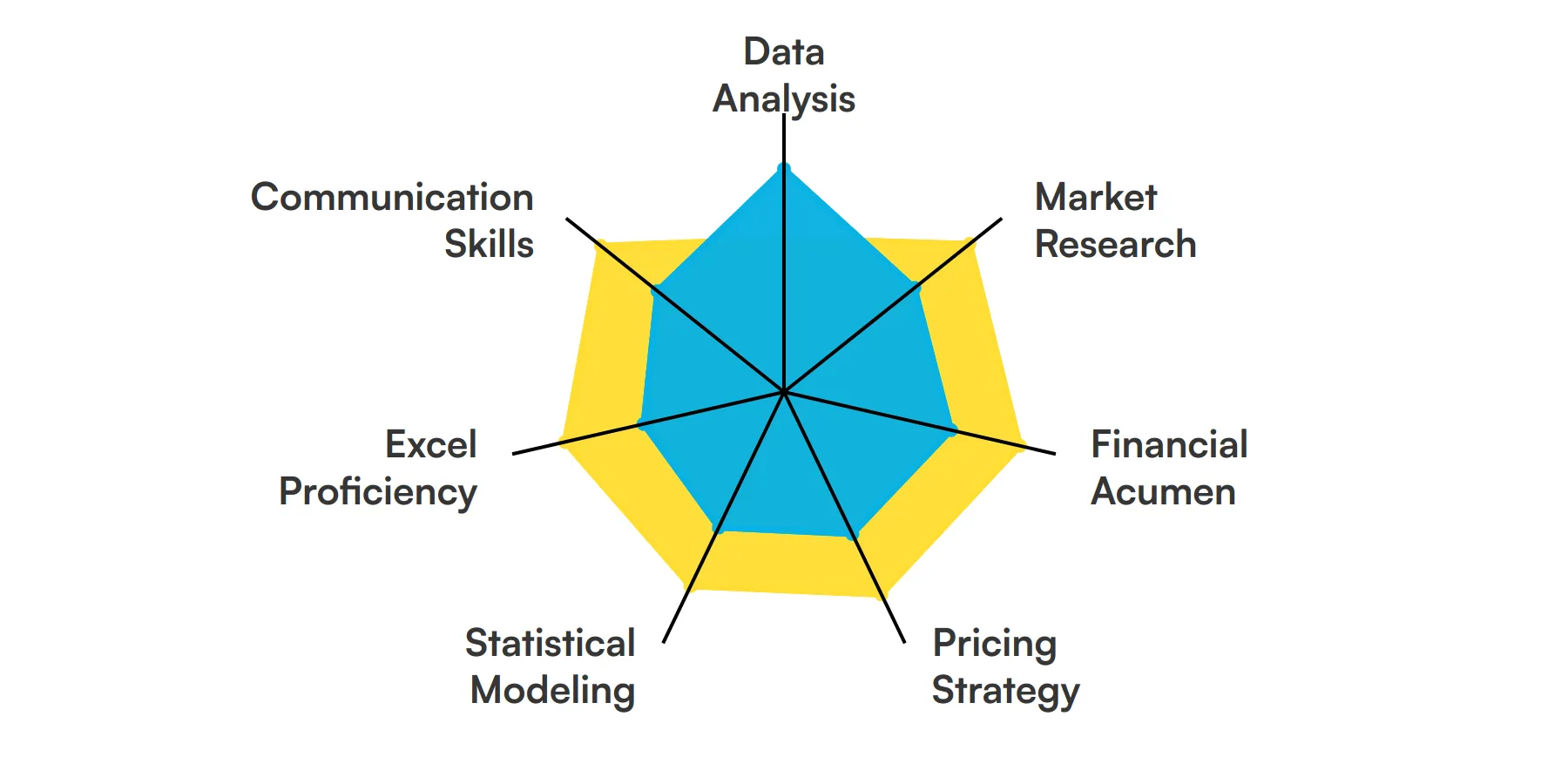
Data Analysis
A Pricing Analyst must be adept at interpreting complex data sets to understand market trends and pricing strategies. This skill involves using statistical tools to analyze pricing metrics and forecast future pricing scenarios, which is fundamental for making informed pricing decisions.
For more insights, check out our guide to writing a Data Analyst Job Description.
Market Research
Understanding the competitive landscape is key for a Pricing Analyst. This involves gathering and analyzing competitor pricing, market demand, and customer preferences to ensure the pricing strategy is competitive and effective.
Financial Acumen
A Pricing Analyst uses financial acumen to assess the profitability and viability of different pricing strategies. This includes understanding cost structures, the impact of pricing on financial performance, and aligning pricing strategies with overall business objectives.
Check out our guide for a comprehensive list of interview questions.
Pricing Strategy
Developing and implementing effective pricing strategies is a core function of the Pricing Analyst role. This skill requires an understanding of pricing models, value-based pricing, and dynamic pricing techniques to optimize revenue.
Statistical Modeling
Statistical modeling allows Pricing Analysts to predict outcomes and set prices with a higher degree of accuracy. Using predictive analytics and econometric models, they can simulate pricing scenarios and their impact on demand.
Excel Proficiency
Proficiency in Excel is essential for a Pricing Analyst, as it is often the primary tool used for data analysis, modeling, and reporting. Advanced Excel skills enable the manipulation of large data sets and the performance of complex calculations.
Communication Skills
Effective communication is crucial for Pricing Analysts to convey complex data and insights in an understandable way. They must be able to present their findings and strategies clearly to stakeholders to support business decisions.
8 secondary Pricing Analyst skills and traits
The best skills for Pricing Analysts include Problem Solving, Attention to Detail, Project Management, Negotiation Skills, Technical Writing, Software Proficiency, Adaptability and Team Collaboration.
Let’s dive into the details by examining the 8 secondary skills of a Pricing Analyst.
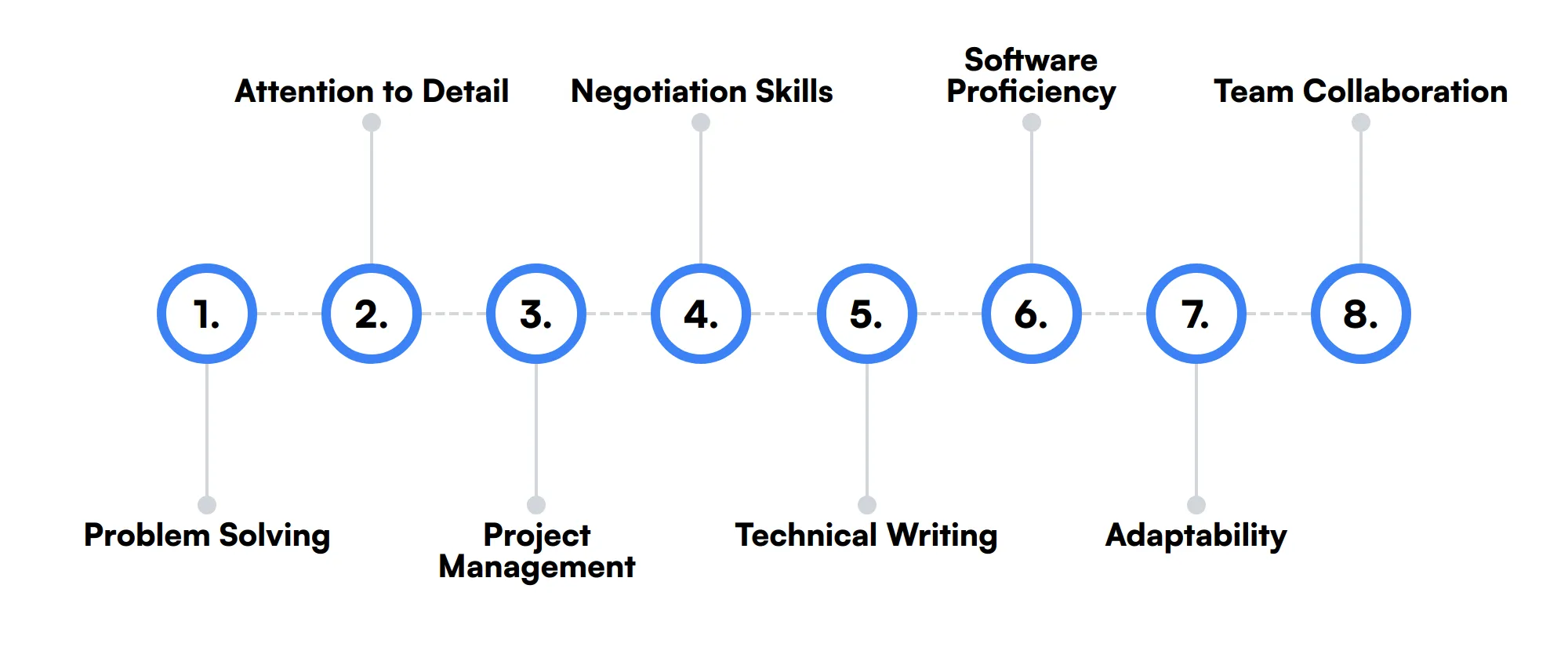
Problem Solving
Pricing Analysts often encounter complex pricing issues that require creative and effective solutions. Problem-solving skills help them navigate these challenges and implement viable pricing strategies.
Attention to Detail
Accuracy is important in pricing analysis to avoid costly mistakes. A keen attention to detail ensures that all factors are considered and that data is accurately represented in pricing decisions.
Project Management
Pricing Analysts may need to manage multiple pricing projects or initiatives simultaneously. Skills in project management help them to plan, execute, and monitor these projects effectively.
Negotiation Skills
In some roles, Pricing Analysts may be involved in negotiating contracts or pricing agreements with vendors or partners. Strong negotiation skills can lead to more favorable terms and outcomes.
Technical Writing
The ability to produce clear and concise reports is valuable for Pricing Analysts. Technical writing skills help them document their methodologies and results for audits and stakeholder reviews.
Software Proficiency
Beyond Excel, familiarity with other analytical and database software such as SQL, R, or Python can enhance a Pricing Analyst's ability to manage and analyze data more effectively.
Adaptability
Market conditions and business strategies can change rapidly; adaptability allows Pricing Analysts to adjust their methods and strategies quickly in response to these changes.
Team Collaboration
Pricing strategies often require input and collaboration from various departments. Being able to work effectively in a team ensures that all perspectives are considered and the best strategies are implemented.
How to assess Pricing Analyst skills and traits
Assessing the skills and traits of a Pricing Analyst is a nuanced process that requires a deep understanding of the role and its impact on your business.
While resumes may highlight a candidate's experience and qualifications, they often fall short in showcasing how effectively an individual can analyze data, conduct market research, or develop pricing strategies. This is where practical assessments come into play, offering a clearer picture of a candidate's capabilities in real-world scenarios.
To streamline this process and ensure you're selecting top talent, consider utilizing Adaface assessments. These tests are designed to measure a candidate's proficiency in key areas such as statistical modeling, financial acumen, and Excel skills, while also evaluating their communication abilities. By integrating Adaface into your hiring process, you can achieve an 85% reduction in screening time, ensuring that you focus only on the most promising candidates.
Let’s look at how to assess Pricing Analyst skills with these 6 talent assessments.
Data Analysis Test
Our Data Analysis Test evaluates a candidate's ability to analyze and interpret data effectively, crucial for roles requiring analytical decision-making.
The test assesses skills in data modeling, SQL queries, and data interpretation using charts and graphs, focusing on extracting insights and identifying data anomalies.
Candidates proficient in this test can predict outcomes, detect anomalies, and visualize data effectively, demonstrating their capability to handle complex data-driven challenges.

Market Research Test
Our Market Research Test measures a candidate's expertise in market research and data analysis, essential for strategic marketing roles.
This test covers market research techniques, market analysis, and data interpretation, assessing the ability to derive actionable insights from market data.
Successful candidates will demonstrate a strong understanding of market dynamics and the ability to leverage data for strategic decisions.
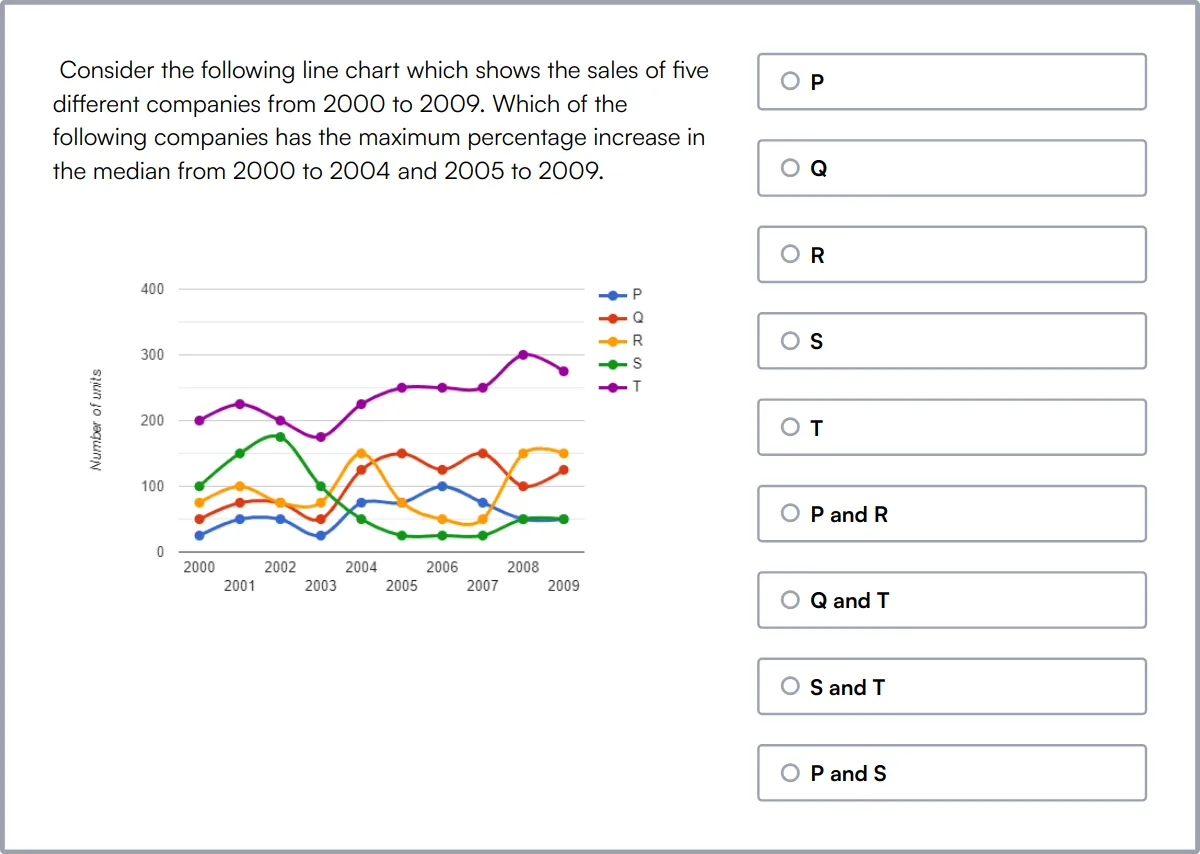
Financial Accounting Online Test
The Financial Accounting Online Test assesses a candidate's knowledge in financial accounting, including principles and financial statement analysis.
It evaluates understanding of accounting principles, financial statements, and financial ratios, focusing on the application of these concepts in real-world scenarios.
High scorers on this test are adept at financial analysis and decision-making, with a strong grasp of accounting standards and financial reporting.
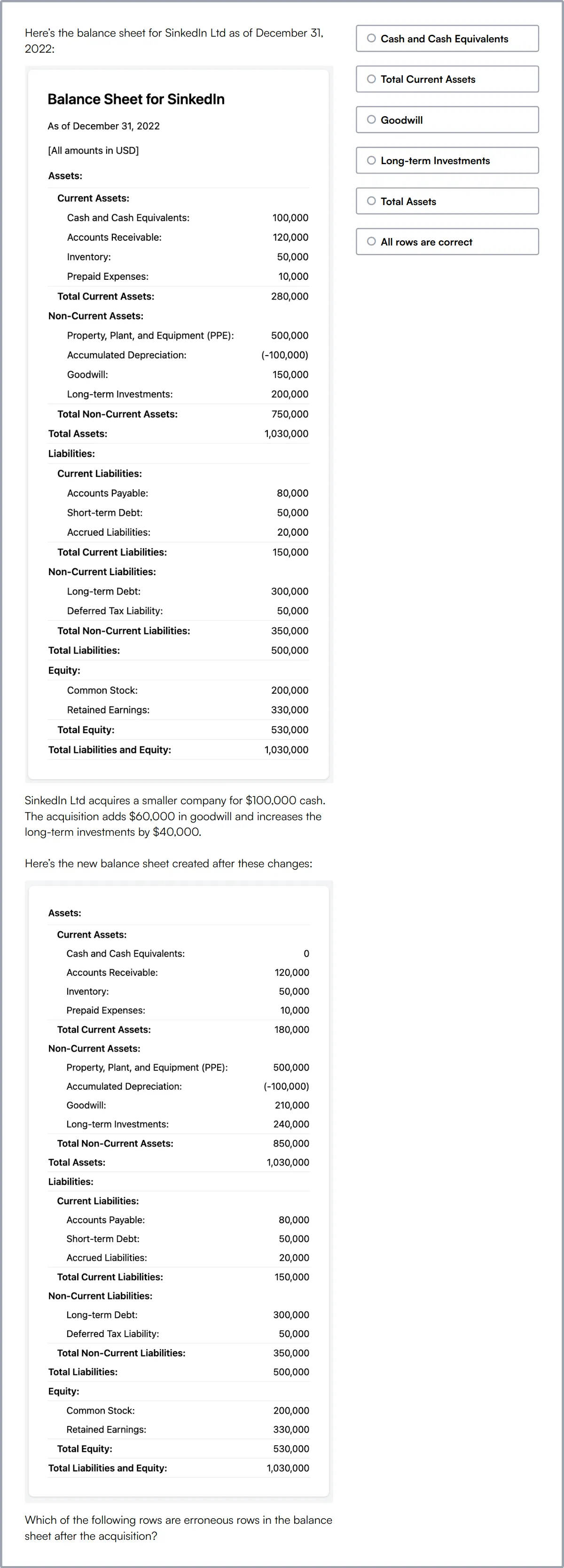
Data Science Assessment Test
Our Data Science Assessment Test gauges a candidate's proficiency in data science, particularly in machine learning and data manipulation.
The test challenges candidates with questions on statistics, machine learning techniques, and the use of Python/R for data analysis.
Candidates excelling in this test can effectively implement predictive models and are proficient in statistical analysis and data-driven problem solving.
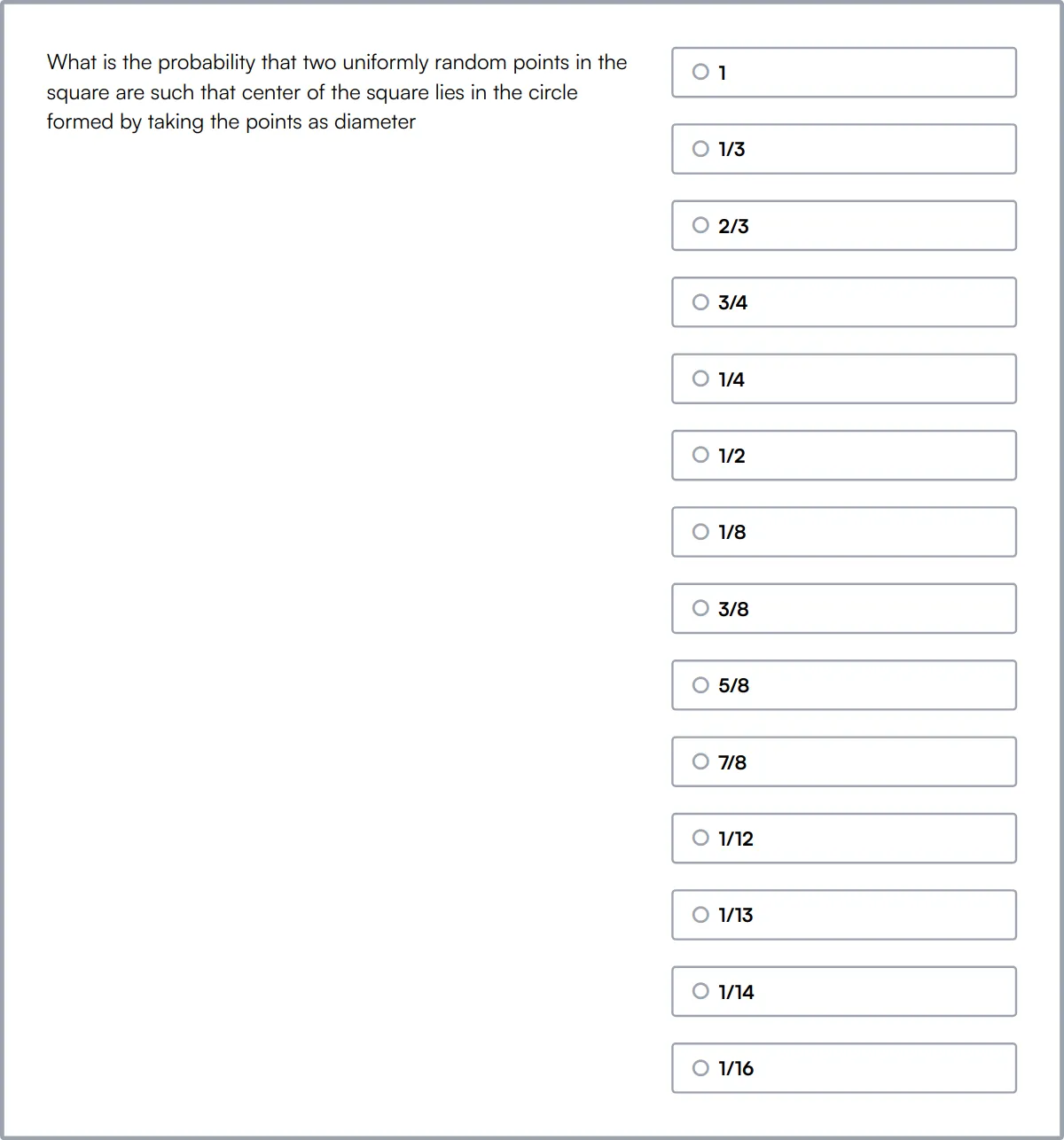
Excel Test
The Excel Test evaluates a candidate's ability to manage and analyze large datasets using Excel, a fundamental tool for many business functions.
This test examines proficiency in advanced Excel functions like VLOOKUP, PivotTables, and data visualization through charts and graphs.
Skilled candidates can efficiently manipulate data, create complex reports, and automate tasks to enhance productivity using Excel.
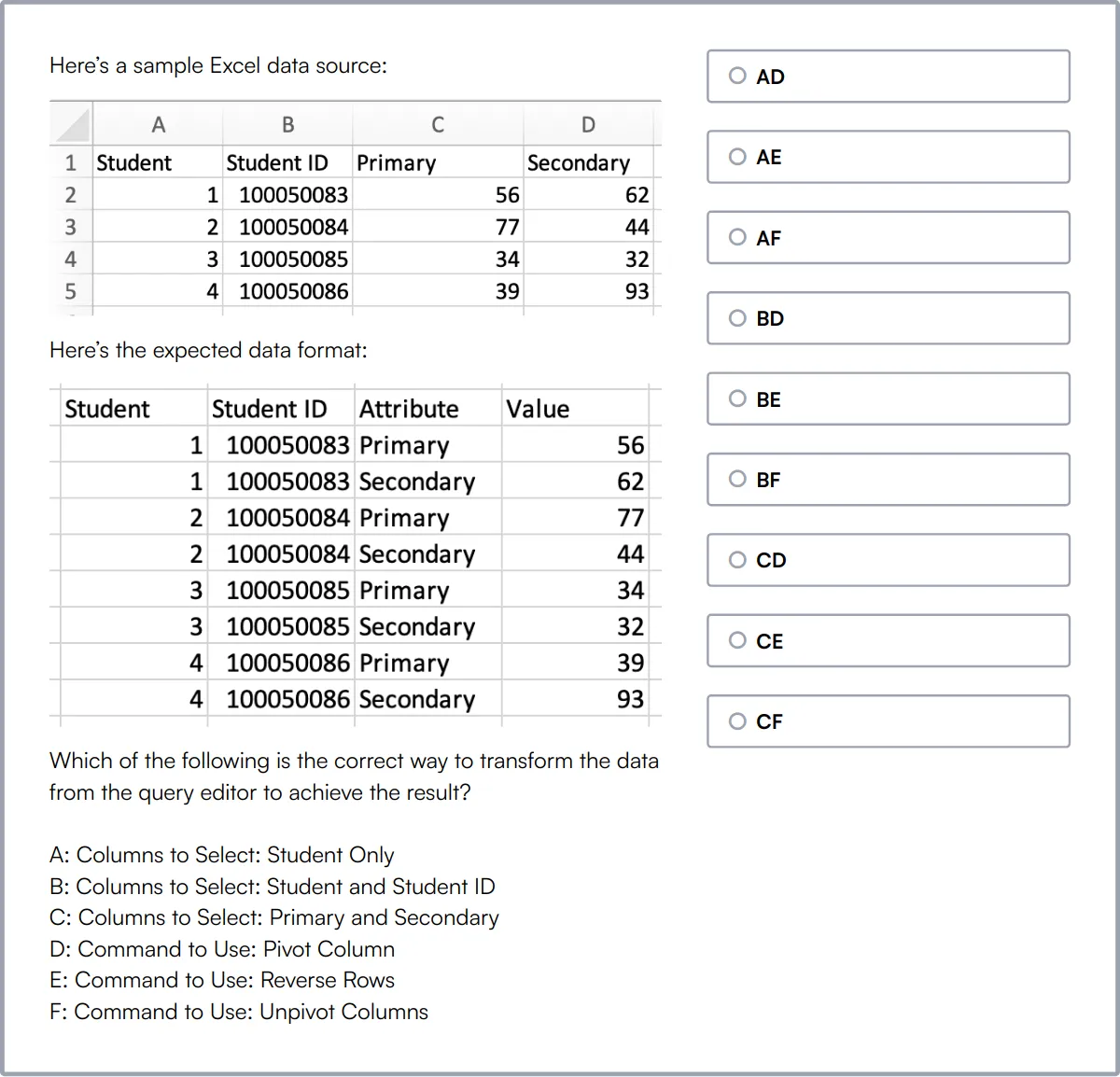
Communication Skills Test
Our Communication Skills Test assesses a candidate's ability to communicate effectively in various professional scenarios.
The test evaluates verbal reasoning, critical thinking, and situational judgement, focusing on the candidate's ability to articulate ideas and engage with others constructively.
Candidates who perform well demonstrate strong interpersonal skills, the ability to resolve conflicts, and the capacity to convey complex information clearly.
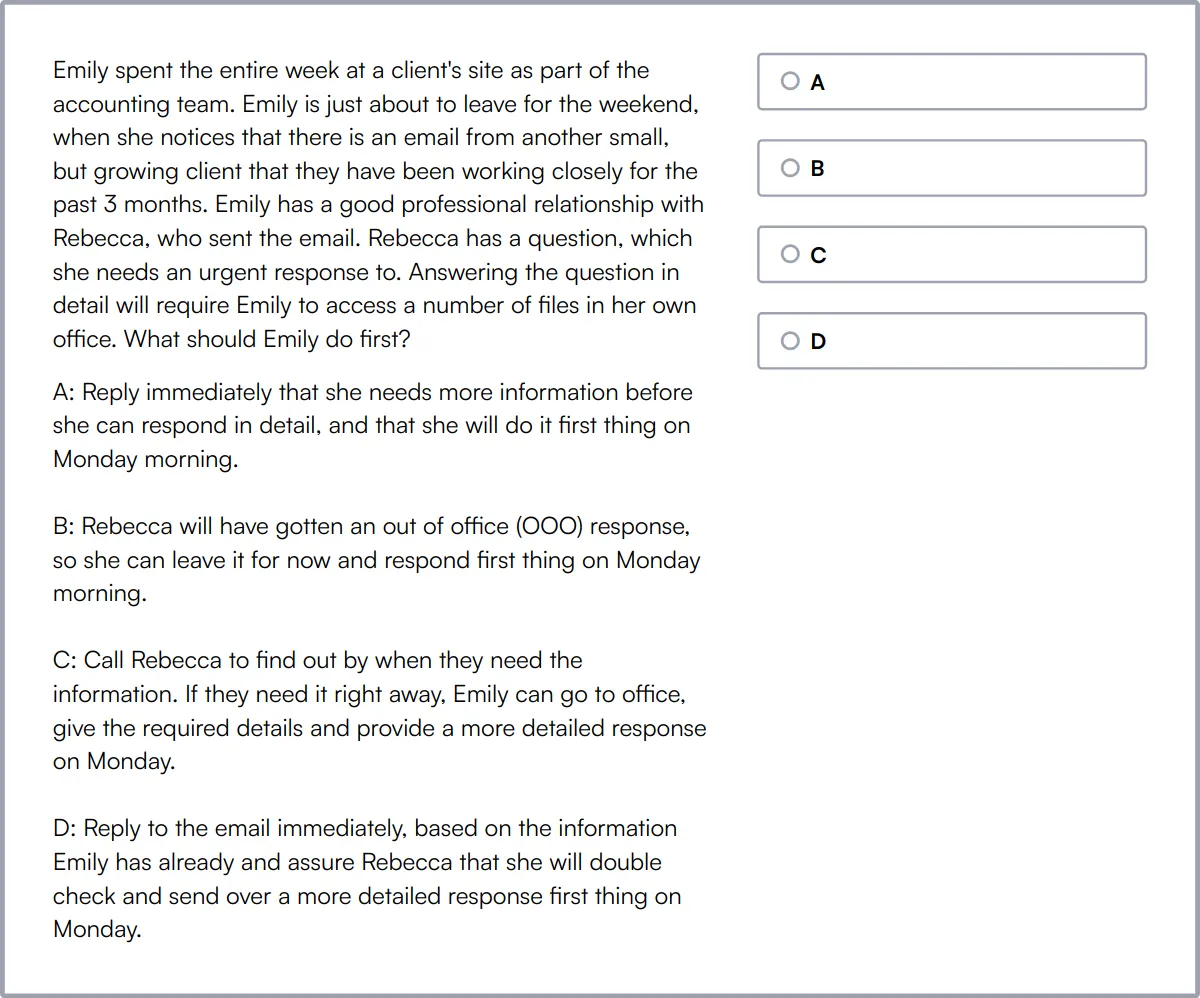
Summary: The 7 key Pricing Analyst skills and how to test for them
| Pricing Analyst skill | How to assess them |
|---|---|
| 1. Data Analysis | Evaluate candidate's ability to interpret and derive insights from data. |
| 2. Market Research | Assess understanding of market conditions and customer preferences. |
| 3. Financial Acumen | Test knowledge of financial principles and their application in pricing. |
| 4. Pricing Strategy | Review experience in developing effective pricing models and strategies. |
| 5. Statistical Modeling | Check proficiency in using statistical tools to predict market trends. |
| 6. Excel Proficiency | Verify ability to manipulate, analyze, and present data using Excel. |
| 7. Communication Skills | Observe clarity, effectiveness, and adaptability in verbal and written communication. |
Financial & Excel Modeling Test
Pricing Analyst skills FAQs
What are the key skills required for a Pricing Analyst role?
Key skills include Data Analysis, Market Research, Financial Acumen, Pricing Strategy, Statistical Modeling, Excel Proficiency, Communication Skills, Problem Solving, Attention to Detail, Project Management, Negotiation Skills, Technical Writing, Software Proficiency, Adaptability, and Team Collaboration.
How can recruiters assess a candidate's data analysis skills?
Recruiters can assess data analysis skills through technical assessments, case studies, and reviewing past work samples. Asking candidates to explain their data analysis process during interviews can also be insightful.
Why is market research important for a Pricing Analyst?
Market research helps Pricing Analysts understand market trends, customer behavior, and competitive pricing. This information is crucial for developing effective pricing strategies.
What tools should a Pricing Analyst be proficient in?
A Pricing Analyst should be proficient in Excel, statistical software (like R or SAS), and data visualization tools (like Tableau or Power BI). Familiarity with ERP and CRM systems is also beneficial.
How can communication skills impact a Pricing Analyst's effectiveness?
Strong communication skills enable Pricing Analysts to present their findings clearly, collaborate with team members, and negotiate with stakeholders. This ensures that their pricing strategies are understood and implemented effectively.
What methods can be used to evaluate a candidate's problem-solving abilities?
Problem-solving abilities can be evaluated through situational interview questions, case studies, and practical tests. Asking candidates to describe past challenges and how they resolved them can also provide insights.
How important is Excel proficiency for a Pricing Analyst?
Excel proficiency is critical for data manipulation, analysis, and visualization. Pricing Analysts often use Excel for complex calculations, creating models, and generating reports.
What role does adaptability play in a Pricing Analyst's job?
Adaptability allows Pricing Analysts to respond to market changes, new data, and evolving business needs. It ensures they can adjust their strategies and tools to stay effective in a dynamic environment.

40 min skill tests.
No trick questions.
Accurate shortlisting.
We make it easy for you to find the best candidates in your pipeline with a 40 min skills test.
Try for freeRelated posts
Free resources



